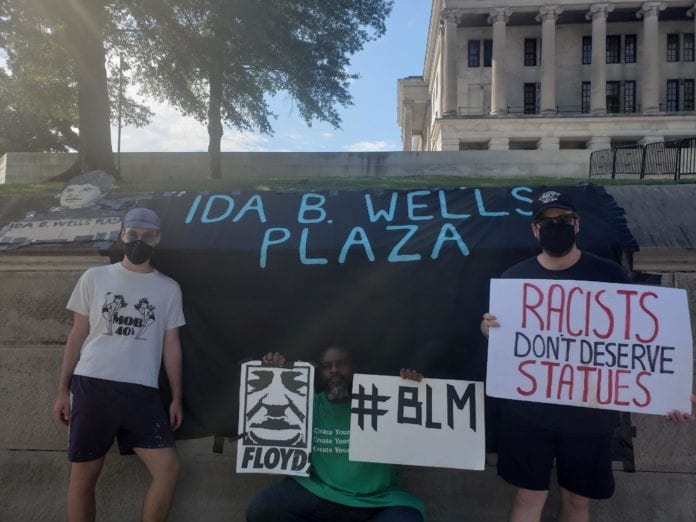by Kimberlee Kruesi —
NASHVILLE — Tennessee now leads the nation in criminalizing common protest tactics, with penalties including the denial of voting rights for pitching a tent on the Capitol grounds. But outrage over racial injustice isn’t going away, and civil rights advocates say the law was pulled from an age-old playbook that hasn’t stood up to history.
Just like the Southern politicians who strained to maintain segregation in the 1950s and 60s, contemporary elected leaders vexed by the Occupy Wall Street movement, demonstrations against oil and gas pipelines and this year’s protests against racial injustice have often sought to use the criminal justice system to suppress mass movements.
The most contentious portion, imposed in response to the demonstrators who camped outside the Capitol this summer to raise pressure on lawmakers, changes“illegal camping” on state property from a misdemeanor to a felony, punishable by up to six years in prison. Felony convictions result in a loss voting rights in Tennessee.
That alarms advocates, who are all too aware that restoring voting rights after felony convictions is an uphill battle in Tennessee. But they’re not going away, said Justin Jones, a young Black activist. He was repeatedly arrested outside the Capitol this summer, charged with various misdemeanors that would now be felonies.
“They’re holding onto an old vision of southern aristocracy and fear a more diverse America. That’s why they attack voting and protests,” Jones tweeted after Republican Gov. Bill Lee signed the law on Aug. 20 “But they can’t stop the movement.”
Segregationists also criminalized protests across the Deep South, but failed to suffocate the civil rights movement, said Justin Rose, who teaches political science at Rhodes College in Memphis.
“I think it’s especially ironic that all this is happening in the wake of John Lewis and C. T. Vivian’s deaths,” Rose said. Both civil rights giants got their starts as organizers in Tennessee, mobilizing lunch counter sit-ins and Freedom Rides.
“When you think of two people who embody peaceful protests, who fought for the right to vote, who were abused and had their lives threatened … their actions would now result in the loss of voting rights,” Rose said.
During the Montgomery bus boycott in Alabama, city officials targeted Black-owned taxi companies that provided alternative transportation, demanding they charge minimum fares. People then turned to private vehicles, and city ticketed Black drivers with passengers. But the demonstrators didn’t quit and the city eventually relented, desegregating the system and making Martin Luther King Jr. a national figure.
When Vivian and Lewis sought to register Black voters in Selma, Alabama, a judge banned gatherings of three or more civil rights organizers, issuing a clearly unconstitutional injunction that also made it illegal for two people to talk about voter registration or civil rights in the city. The U.S. Department of Justice filed suit against the city alleging multiple violations of the 1964 Civil Rights Act, and the injunction was dissolved.
Years later in California, state lawmakers were shocked by the Black Panther Party’s tactic of openly displaying weapons while protesting police brutality. In 1967, they made it a felony to carry firearms in public places without a governmental license, a law still in effect today.
During the first years of the Donald Trump presidency, legislators in nearly 20 states proposed bills in response to public protests. A handful passed, including laws criminalizing the occupations that sought to block gas and oil pipelines in the Dakotas and Appalachia. It took repeated court challenges and the advent of cheaper renewable energy, but both pipelines were ultimately abandoned.
Five state legislatures floated various measures to punish this year’s protests, according to the International Center for Not-for-Profit Law. But while Missouri, New Jersey, New York and Virginia have proposals pending, Tennessee was the first to enact such a law, and the only one to make it a felony to pitch a tent on the statehouse lawn. Local officials in Seattle and Louisville imposed similar bans, but with lesser penalties.
Gov. Lee and Republican lawmakers are trying to “keep those who protest in their place,” state Rep. Yusuf Hakeem, a Black Democrat from Chattanooga, recently told reporters. “Our community is not being well-served.”
Supporters counter that the new law does not impact peaceful protests, nor infringe on free speech, and will better protect police and public property. They point to a demonstration in late May that led to people setting fires inside Nashville’s historic courthouse — a handful of those participants await trial on rioting and arson charges — and the toppling of a statue honoring Edward Carmack, a state lawmaker and newspaper publisher who espoused racist views. No one has been arrested in that incident.
The Nashville demonstrators say such crimes were already covered by existing laws.
Otherwise, the Nashville demonstrations have remained largely peaceful, even as troopers repeatedly removed tents from the Capitol grounds, and lawmakers who voted to approve the law were briefly blocked by young Black protesters from leaving their parking garage.
The governor declined to meet with that group, although he did promise other Black leaders that he’d address “racial reconciliation” amid other issues before signing the law. “On balance, it was the right thing to do,” he said.
The demonstrators packed up their gear the day after lawmakers went home. Now the American Civil Liberties Union is watching for constitutional violations.




